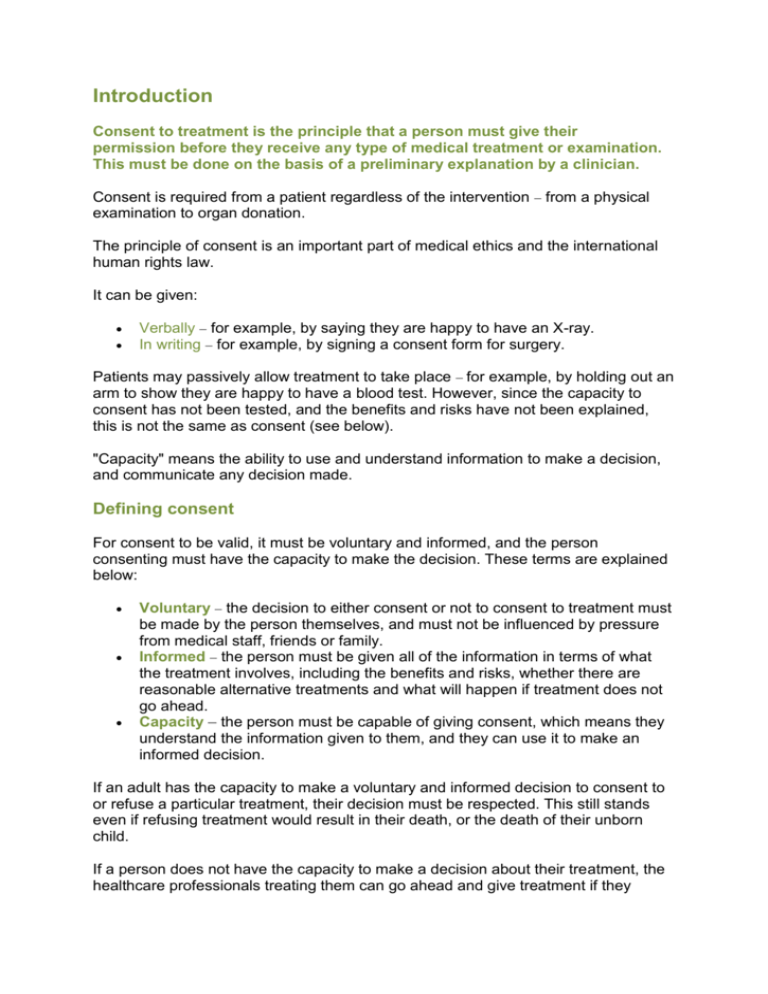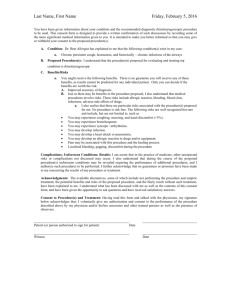Confidentiality and Consent Information
advertisement

Introduction Consent to treatment is the principle that a person must give their permission before they receive any type of medical treatment or examination. This must be done on the basis of a preliminary explanation by a clinician. Consent is required from a patient regardless of the intervention – from a physical examination to organ donation. The principle of consent is an important part of medical ethics and the international human rights law. It can be given: Verbally – for example, by saying they are happy to have an X-ray. In writing – for example, by signing a consent form for surgery. Patients may passively allow treatment to take place – for example, by holding out an arm to show they are happy to have a blood test. However, since the capacity to consent has not been tested, and the benefits and risks have not been explained, this is not the same as consent (see below). "Capacity" means the ability to use and understand information to make a decision, and communicate any decision made. Defining consent For consent to be valid, it must be voluntary and informed, and the person consenting must have the capacity to make the decision. These terms are explained below: Voluntary – the decision to either consent or not to consent to treatment must be made by the person themselves, and must not be influenced by pressure from medical staff, friends or family. Informed – the person must be given all of the information in terms of what the treatment involves, including the benefits and risks, whether there are reasonable alternative treatments and what will happen if treatment does not go ahead. Capacity – the person must be capable of giving consent, which means they understand the information given to them, and they can use it to make an informed decision. If an adult has the capacity to make a voluntary and informed decision to consent to or refuse a particular treatment, their decision must be respected. This still stands even if refusing treatment would result in their death, or the death of their unborn child. If a person does not have the capacity to make a decision about their treatment, the healthcare professionals treating them can go ahead and give treatment if they believe it is in the person’s best interests. However, the clinicians must take reasonable steps to seek advice from the patient’s friends or relatives before making these decisions. How to give consent Consent should be given to the healthcare professional directly responsible for the person's current treatment, such as the nurse arranging a blood test, the GP prescribing new medication or the surgeon planning an operation. If someone is going to have a major medical procedure, such as an operation, their consent should ideally be obtained well in advance, so they have plenty of time to examine any information about the procedure and ask questions. If they change their mind at any point before the procedure, the person is entitled to withdraw their previous consent. If they are able to, consent is usually given by patients themselves. However, someone with parental responsibility may need to give consent for a child to have treatment. Consent from children and young people People aged 16 or over are entitled to consent to their own treatment, and this can only be overruled in exceptional circumstances. Like adults, young people (aged 16 or 17) are presumed to have sufficient capacity to decide on their own medical treatment, unless there is significant evidence to suggest otherwise. Children under the age of 16 are presumed to lack capacity, but can consent to their own treatment if it is thought that they have enough intelligence, competence and understanding to fully appreciate what is involved in their treatment. Otherwise, someone with "parental responsibility" can consent for them. When their consent can be overruled If a young person refuses treatment, and by doing so this may lead to their death or a severe permanent injury, their decision can be overruled by the Court of Protection. This is the legal body that oversees the operation of the Mental Capacity Act (2005). The parents of a young person who has refused treatment may consent for them, but it is usually thought best to go through the courts in such situations. Parental responsibility If a child who is under 16 does not have the capacity to consent, someone with parental responsibility can consent for them, but that person must have the capacity to give consent. If a parent refuses to give consent to a particular treatment, this decision can be overruled by the courts if treatment is thought to be in the best interests of the child. If one person with parental responsibility gives consent and another does not, the healthcare professionals can choose to accept the consent and perform the treatment in most cases. If the people with parental responsibility disagree about what is in the child’s best interests, the courts can make a decision. In an emergency, where treatment is vital, and waiting to obtain parental consent would place the child at risk, treatment can proceed without consent. Who has parental responsibility? A person with parental responsibility for a child could be: the child’s mother or father the child’s legally appointed guardian a person with a residence order concerning the child a local authority designated to care for the child a local authority or person with an emergency protection order for the child Page last reviewed: 03/06/2014 Next review due: 03/06/2016 From NHS Choices http://www.nhs.uk/Conditions/Consent-to-treatment/Pages/Children-under-16.aspx When consent isn't needed There are a few exceptions when treatment may be able to go ahead without the person's consent, even if they are capable of giving their permission. These circumstances are outlined below. Additional procedures There may be some circumstances when, during an operation, it becomes obvious that the person immediately requires an additional emergency procedure that was not included in their original consent. For example, they may be having abdominal surgery, when the surgeon notices that their appendix is dangerously close to bursting and needs to be removed. If it's felt that it would be too dangerous to delay the additional procedure to get consent, this procedure can go ahead if it is considered to be in the person's best interests. However, extra procedures cannot be done just because it would be convenient for the healthcare professionals. There has to be a clear medical reason why it would be unsafe to wait to obtain the person's consent. Emergency treatment If a person requires emergency treatment to save their life, and they are unable to give consent as a result of being incapacitated (for example, they are unconscious), treatment will be carried out. In these cases, the reasons why treatment was necessary will be fully explained once they have recovered. Mental health conditions Under the Mental Health Act (1983), people with certain mental health conditions – such as schizophrenia, bipolar disorder or dementia – can be compulsorily detained and treated at a hospital or psychiatric clinic without their consent, if deemed necessary. If the person lacks capacity (the ability to understand information and use it to make a decision) and has not previously expressed their wishes, their mental health condition may be treated without consent, as may any related conditions, such as those resulting from self-harm. However, unrelated physical conditions cannot be treated without consent. An advance decision prohibiting certain types of treatment can be overruled if a person is being held under the 1983 Act, even if they made the original decision when they were capable. Self-harm and attempted suicide In cases of self-harm or attempted suicide where the person refuses treatment and was competent when they harmed themselves, it may be necessary to see if they can be treated without consent under the 1983 act. This can happen if a person has a serious mental health condition that requires hospital treatment. The person's nearest relative or an approved social worker must make an application for the person to be forcibly kept in hospital and treated. Two doctors must assess the person's condition. Risk to public health Under the Public Health (Control of Disease) Act (1984), a magistrate can order that a person is detained in hospital if they have an infectious disease that presents a risk to public health, such as rabies, cholera or tuberculosis (TB). Severely ill and living in unhygienic conditions Under the National Assistance Act (1948), a person who is severely ill or infirm and is living in unsanitary conditions can be taken to a place of care without their consent. Complaints If you believe that you have received treatment that you did not consent to, you can make an official complaint. Read more about how to make a complaint. Page last reviewed: 03/06/2014 Next review due: 03/06/2016 Confidentiality There are strict laws and regulations to ensure that your health records are kept confidential, and can only be accessed by health professionals who are directly involved in your care. There are a number of different laws that relate to health records. Under the terms of the Data Protection Act (1998) organisations, such as the NHS, must ensure that any personal information that it gathers in the course of its work is: Only used for the stated purpose of gathering the information - which in this case would be to ensure that you receive a good standard of healthcare, and Kept secure It is a criminal offence to breach the Data Protection Act (1998), and doing so can result in imprisonment. The Human Rights Act (1998) also states that everyone has the right to have their private life respected, which also extends to the right of keeping your health records confidential. If you are under 18 and want to see your health records, the hospital must decide whether you have a proper understanding about the nature of the request. If not, a parent can make the request on your behalf. However, the authority would only disclose information to your parent if they thought it was in your interests. What you can expect from us As a patient you can expect to: Be treated with respect and dignity at all times Receive a clear explanation of your condition and the treatment options available, including the benefits and risks involved Give your consent before any operation or procedure Have your parents or carers informed about your progress if you request this. What we ask you to do As a patient we ask you to: Listen carefully to information about your treatment and medication, and ask our staff for more explanation if anything is unclear or worrying you Treat our staff, fellow patients and visitors politely and with respect. We will not accept violence or racial, sexual or verbal harassment towards anyone in our hospitals Let us know if you are not happy with your care Tell staff if you are going out of the ward or unit Your rights If you are under 18 you have the right to: See a doctor, nurse or other health professional alone Give consent or refuse treatment Ask to see your health records To find out more about your rights as an NHS patient, go to www.nhs.uk







